While most guitar players are very particular about their guitar, amp, and pedal choices, they may not be aware of the importance of guitar cables in their setup.
A good guitar cable is a crucial part of your overall setup. No rig is complete without a set of sturdy and durable cables that preserve the unique character and tone of your sound. High quality guitar cables are an excellent investment that can help you develop your sound, and are a must for guitarists whether they’re a beginner or seasoned pro.

With so many options to choose from in a range of prices, it can become a confusing and daunting task to ensure you’ve made the right choice for your cable. Well, no need to “fret” over this as we’ve included reviews on all the best guitar cables at each price point below. We also put together an in-depth informative guide at the bottom of the page here for those of you who want to learn more about guitar cables before choosing one.
| Name of Product | Image of Product | Description | Price Range | Full Review |
|---|---|---|---|---|
| 1. Mogami Platinum Guitar Cable (Best Overall) | 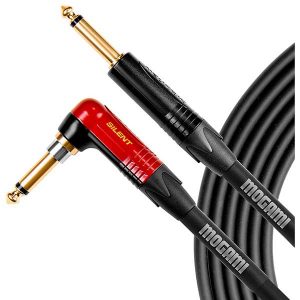 | Length: 12 feet (3.65 meters) Connector Type: Straight to Right Angle | $120 | Read Full Review Below |
| 2. Ernie Ball Instrument Cable (Best Value) | 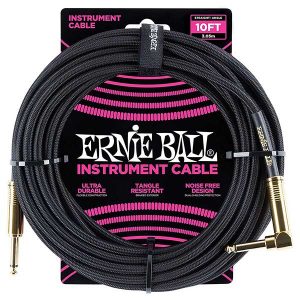 | Length: 25 feet (7.62 meters) Connector Type: Straight to Right Angle | $40 | Read Full Review Below |
| 3. Fender Deluxe Series Guitar Cables (Best Budget) | 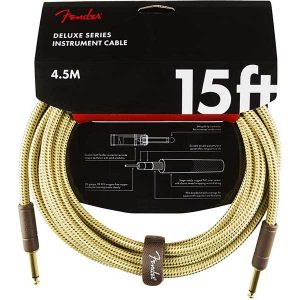 | Length: 15 feet (4.57 meters) Connector Type: Straight to Straight, Angled to Angled, Custom | $26 | Read Full Review Below |
| 4. Mogami Gold Series Guitar Cables (Top of the Line) | 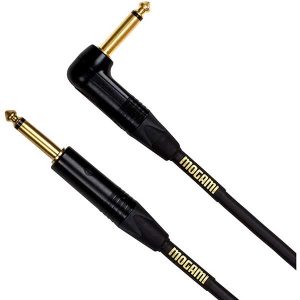 | Length: 25 feet (7.62 meters) Connector Type: Straight to Right Angle | $70 | Read Full Review Below |
| 5. Planet Waves American Stage Guitar Cable | 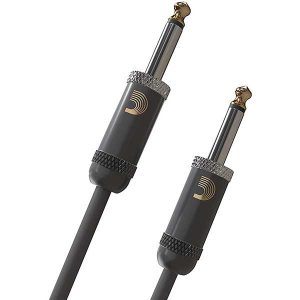 | Length: 20 feet (6.09 meters) Connector Type: Straight to Straight, Straight to Right Angled | $40 | Read Full Review Below |
| 6. Fender Performance Series (No Fuss and Affordable) | 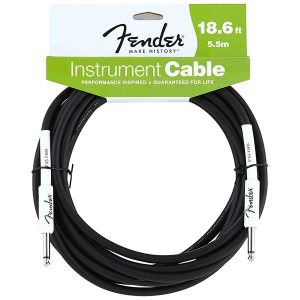 | Length: 18 feet (5.48 meters) Connector Type: Straight to Straight, Straight to Right Angle | $20 | Read Full Review Below |
| 7. George L's 155 Guage Cable | 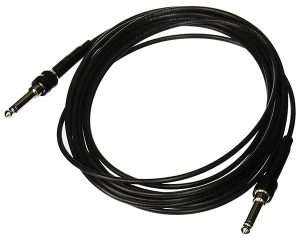 | Length: 20 feet (6 meters) Connector Type: 1/4" Straight to Straight | 60 | Read Full Review Below |
| 8. Orange Crush Instrument Cable | 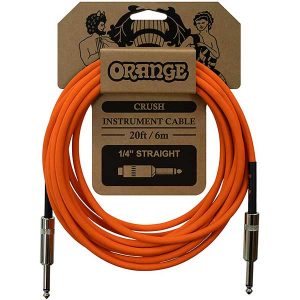 | Length: 20 feet (6 meters) Connector Type: 1/4”, Straight to straight, straight to angled | $20 | Read Full Review Below |
| 9. Canary Premium Instrument Cables | 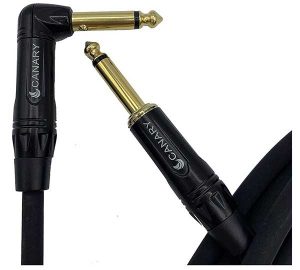 | Length: 10 feet (3.04 meters) 1/4” Straight to Right Angle | $15 | Read Full Review Below |
| 10. D'Addario Instrument Cables | 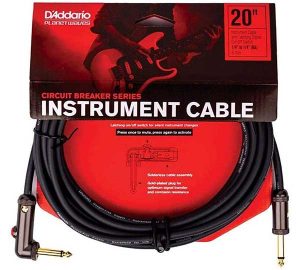 | Length: 20 feet (6 meters) Connector Type: 1/4" Straight to right angle | $25 | Read Full Review Below |
| 11. Monster Rock Instrument Cables | 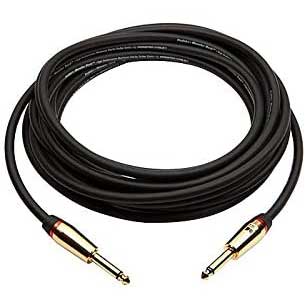 | Length: 12 Feet (3.65 meters) Connector Type: Straight to Straight | $60 | Read Full Review Below |
| 12. GLS Audio Professional Series Guitar Cables | 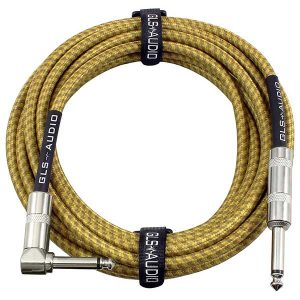 | Length: 20 feet (6.09 meters) Connector Type: TS 1/4” Straight to Right Angle | $15 | Read Full Review Below |
| 13. ProCo Evolution Studio Guitar Cables | 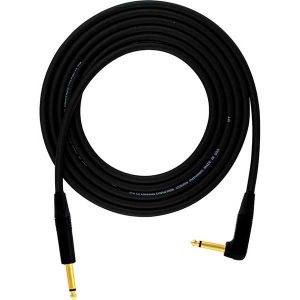 | Length: 10 feet (3.04 meters) Connector Type: Straight to Right Angle | $50 | Read Full Review Below |
| 14. Donner Guitar Cable | 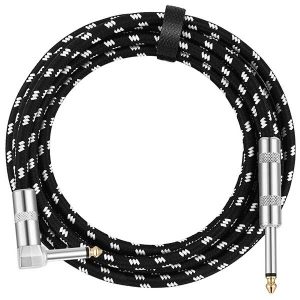 | Length: 18 feet (5.48 meters) Connector Type: Straight to Right Angle | $13.50 | Read Full Review Below |
| 15. Hosa GTR-225 Guitar Cable | 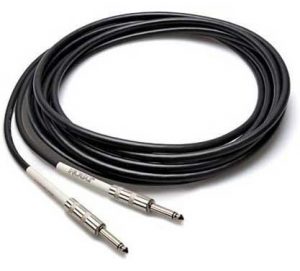 | Length: 25 feet (7.62 meters) Connector Type: Straight to Straight | $15 | Read Full Review Below |
Here Are the Best Guitar Cables
1. Mogami Platinum Guitar Cable (Best Overall)
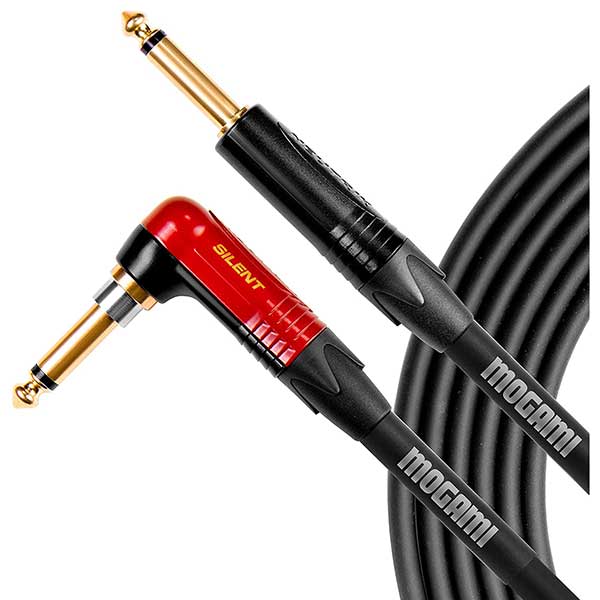
| Estimated Price | $120 |
| Length | 12 feet (3.65 meters) |
| Insulation Material | PVC |
| Connector Type | Straight to Right Angle (optional Neutrik SilentPlug connector) |
My Review: The first cable on this list comes from the gold standard of cable manufacturers, Mogami Cable made in Nagano, Japan. Now under the ambit of Marshall Electronics (not amplification), Mogami has a cult following among musicians and technicians alike in the audio/video industry and their artist roster features hundreds if not thousands of legendary bands and artists, like Fleetwood Mac and Pearl Jam. Mogami cables are widely used in studios around the world and their cables are famous for extremely high signal clarity and low noise. The Mogami Platinum series is their high-end cable designed for exceptional signal quality.
Overall Build and Design: The Mogami platinum series comes in 12ft, 20ft, or 40ft options. The overall design and build is super high quality, reminiscent of a high end product. The cables are designed to provide maximum signal clarity over long distances without sacrificing the high end as is the case with cheaper cables.
Insulation and Flexibility: The outer shielding of the Platinum cable is made with conductive PVC material that eliminates handling noise. The copper spiral shielding gives 100% coverage from RF interference. The cable retains flexibility and is highly durable. Mogami provides a ‘no excuses’ lifetime warranty on all its cables.
Connector Type: The Platinum cables come with a special gold-plated Neutrik ‘SilentPlug’ connector that blocks the loud and annoying popping noise that comes when plugging and unplugging instruments. This connector has special shielding elements that eliminate a charge build-up inside the jack that can cause disturbances.
Shielding and Signal Quality: The dynamics, sound quality and signal purity of Mogami Platinums are one of, if not the, most superior in the business. The best part is that these cables create an exact reproduction of your guitar’s tone and character, without trying to enhance it or change its sound in any manner. This is possible with its pure, oxygen-free copper core and ultra-low capacitance that ensures signal integrity.
Notable Features:
- Excellent signal clarity and ultra-low capacitance
- Gold-plated silent plug for noiseless instrument changes
- Flexible yet extremely durable and sturdy
- No-excuses’ lifetime guarantee
- Special shielding to cut out charge build up and resultant noise
2. Ernie Ball Instrument Cable (Best Value)
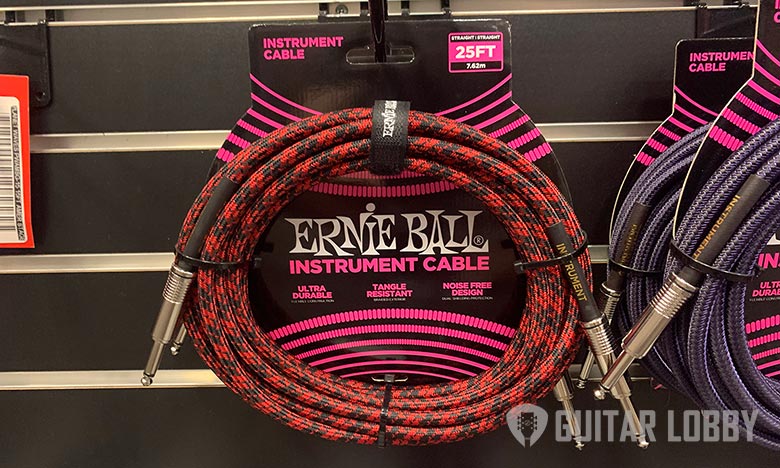
| Estimated Price | $40 |
| Length | 25 feet (7.62 meters) |
| Insulation Material | Braided woven jacket over PVC |
| Connector Type | Straight to Right Angle |
My Review: Ernie Ball instrument cables are a noteworthy combination of quality, toughness, and affordability. Made with 99.9% oxygen-free copper and dual shielding, they manage to significantly cut down noise and offer a clear tone that retains the richness of your guitar tone. The outer braided woven jacket keeps the cables tangle-resistant and makes them easy to coil without the fear of kinking. Available in a variety of bright colors and 25 feet long, these could be the ideal companion for touring musicians looking for durable cables that can take a hit, and sound good too.
Overall Build and Design: Made with multiple shielding layers and a tough outer cover, these cables by Ernie Ball are built to last. Saf to say, they are designed to take rough handling and the usual use and abuse that happens to gear on the road. The tangle-resistant makes them weighty and easy to coil. They’re available in a range of colors from neon green, orange, pink, yellow, gold, neon purple, and other hues which can add a nice funky touch to your onstage presence. Overall, I would say this is the best guitar cable for the money right now.
Insulation and Flexibility: These cables are in no way delicate. They are a great balance of flexibility and toughness, thanks to their tangle-resistant construction. The braided exterior jacket adds an extra layer of toughness that makes it durable enough to be taken on the road without fear of them wearing out or getting damaged.
Connector Type: The straight to right angle connection works well to prevent damage to the guitar’s input jack. Moreover, the plush is available in both nickel plated as well as gold plated options. Both variants are corrosion resistant, so take your pick.
Shielding and Signal Quality: The cables have a 99.9% oxygen-free copper core, which is comparable to most other cables on the list. The dual-shielding with multiple layers, however, is a special feature that cuts down signal loss and preserves the character of the guitar tone, retaining the frequencies and reproducing them well.
Notable Features:
- Multiple shielding layers to cut down handling noise
- Tough braided exterior cover for additional durability
- Tangle-resistant design
- Available in a range of vibrant colors
- Durable enough for rough handling
3. Fender Deluxe Series Cables (Best Budget Guitar Cable)
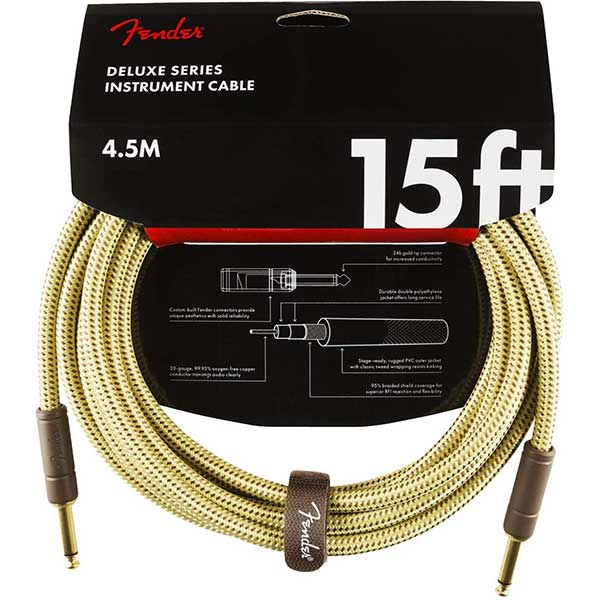
| Estimated Price | $26 |
| Length | 15 feet (4.57 meters) |
| Insulation Material | Tweed Woven Jacket |
| Connector Type | Straight to Straight, Angled to Angled, Custom |
My Review: A legendary name in the world of guitars, Fender brings a high-quality yet pocket-friendly line of cables with its Fender Deluxe series. With braided shielding, custom-molded ends, and 24K gold connectors, users enjoy crisp and clear signal quality. Thanks to its heavy-duty engineering, these beauties are easy to coil and won’t be twisting or distorting out of shape anytime soon. Whether you are a beginner or an experienced player, you’ll appreciate the quality and affordability of these cables.
Overall Build and Design: The first thing that you’ll notice when using these cables is that they’re nice and heavy. The soft-woven yet rugged outer tweed jacket protects the cable from wear and tear, and the substantial design shows that they are built for surviving the usual abuse in the jam room or tours, and also cuts down the risk of twists and kinks. Measuring 15 feet long, these cables are long enough for comfortable use in your own room or a compact rehearsal space without issues, though this wouldn’t be long enough if you’re planning to prance around on large stages. Overall, I would say this is the best budget guitar cable.
Insulation and Flexibility: The cable comes with an 8mm outer PVC cover that keeps the cable well insulated, and also cuts out additional noise. Thanks to the braided shielding, it’s also quite sturdy yet flexible to use, without being stringy and prone to kinks.
Connector Type: This series offers 24K gold plated connectors that don’t corrode with time. The cables come in straight to straight, angled to angled, as well as a custom shop variant that offers a copper coverage shield.
Shielding and Signal Quality: This series uses 95% oxygen-free copper (OFC), which is a specially treated copper that has been made purer to allow for clearer signal quality. Thanks to spiral braided shielding with 20AWG copper, these cables have low capacitance, cut out the noise, and keep the purity of the guitar tone, frequencies, and harmonics intact.
Notable Features:
- 20 AWG, 95% Oxygen-Free Copper used for low capacitance
- Ultra-quiet braided shielding for signal clarity and purity
- 24K gold connectors
- Thick, durable, flexible, kink-resistant construction
- Thick 8 mm outer PVC insulation cuts off unwanted noise
- Tough yet soft-woven tweed outer jacket
- Budget-friendly
Popular Related Article: 18 Must Have Guitar Straps
4. Mogami Gold Series Guitar Cables (Top of the Line)
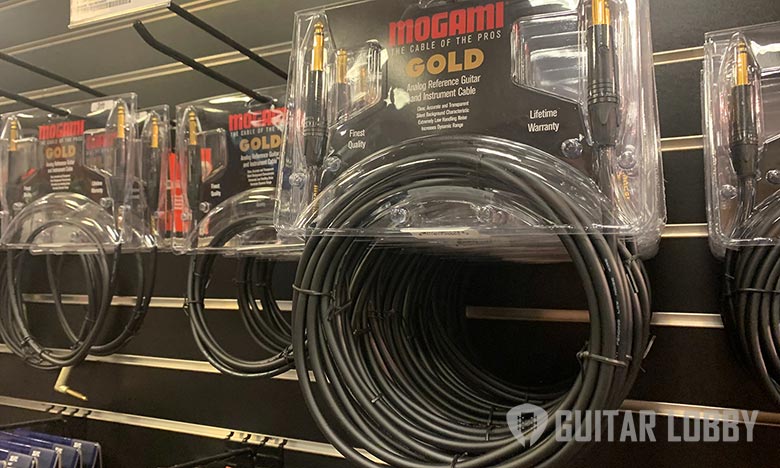
| Estimated Price | $70 |
| Length | 25 feet (7.62 meters) |
| Insulation Material | PVC Anti-Static Layer |
| Connector Type | Straight to Right Angle |
My Review: We’ve already spoken about Mogami platinum and how they are the benchmark-setting cables. But their price point may put them out of the reach of many aspiring and bedroom guitarists. This is why we’re also including Mogami Gold cables on this list. They’re of excellent quality, with superior sound clarity, flexibility, and durability that Mogami cables are known for. Its multi-layer shielding is a cut above the rest, and the resultant sound is proof of that. And the best part? They’re almost half the price of the Platinums. So if you’re looking for high quality
Overall Build and Design: Coming from the Mogami brand, these cables come across as well-made even before you plug them in. Tough yet flexible, and easy to coil and handle. At a length of 25 feet, you can easily plug into massive stages and prance around all you want without the fear of being held back, literally and figuratively.
Insulation and Flexibility: For most guitar cables, a sturdy protective outer layer comes at the cost of flexibility, but not for the Mogami Gold. These cables are very flexible and incredibly tough at the same time. The outer insulation is infused with carbon, which eliminates all handling crackles and noise.
Connector Type: The Mogami Gold has some of the most solid plugs we’ve come across, which plays a big role in determining the life of a guitar cable. Its straight to right angle plugs snugly fit into your input jack, while the rounded plug edges prevent any accidental scratching of your guitar’s body. Both the plus are gold plated, which protects them from rusting.
Shielding and Signal Quality: The way these cables are shielded is what separates the Mogami Gold from the other cables in the market. While other brands also use ultra-pure, oxygen-free copper as their core, Mogami also has other extra layers of shielding. The first is a conductive polymer sub-shield, the second is an ultra-high-density spiral shield, Finally, the carbon-infused PVC shielding all together works to eliminate any interference and handling noise. The result is a 100% transparent, crystal clear sound from your instrument.
Notable Features:
- Superior sound clarity and silent background
- Ultra-pure, oxygen-free copper core for low capacitance
- Flexible yet tough exterior cover
- Multiple layers of shielding eliminate static and noise
- Carbon infused PVC shielding for noise rejection
- Gold plated plugs for corrosion resistance
5. Planet Waves American Stage Guitar Cable
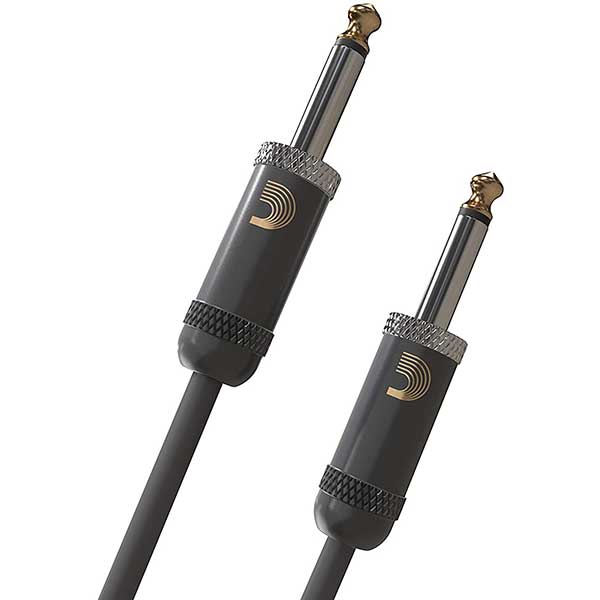
| Estimated Price | $40 |
| Length | 20 feet (6.09 meters) |
| Insulation Material | NA |
| Connector Type | Straight to Straight, Straight to Right Angled |
My Review: Sit up and take notice of these beauties, because they’re endorsed by some serious musicians out there, with Plini and Bryan Beller on the list. The American Stage series by D’addario Planet Waves boasts of excellent durability, zero interference noise, and sound clarity that retains the natural vibrance and character of your guitar tone. The last line alone explains the celebrity endorsements. They utilize a ‘heliofused’ soldering technique, which the brand claims offer the strongest and indestructible ground connection vis-a-vis other soldering methods.
Overall Build and Design: Guitarists are known to trip over their cables onstage more often than not, and these cables almost seem to have addressed that fact into their design. The tough exterior construction and flexibility ensure that they can weather rough handling onstage and on the road, and last a long time. The 20 feet length offers plenty of room for musicians to walk around the stage during a performance.
Insulation and Flexibility:
While the cables are quite flexible, they are also impressively sturdy and tough. They surely appear to be designed to withstand the wear and tear that happens with frequent tours and gigging.
Connector Type: The cables are available in both straight to straight and straight o right-angled variants. But what really sets them apart is the design of their connectors. The connectors are made by Neutrik, a world-renowned connector manufacturer, in a patented design by the brand called ‘Geotip’.
This is a special proprietary tip design by the brand that offers a secure connection to the instrument when plugging in, which apparently also works to compensate for any connection incompatibilities as well. As a result, the cables always have a secure connection to the instrument. As if that’s not a cool enough feature, the connectors are soldered using a ‘Heliofuse’ technology which offers a rock-solid grounding connection, a technique they claim is superior to those used by other cables.
Shielding and Signal Quality: American stage is known to offer a clean, transparent signal that reproduces the instrument’s natural tone without cutting out any frequencies. The 100% shielded coverage and 95% tinned copper makes this feat possible, and also prevents corrosion.
Notable Features:
- Heliofused soldering provides superior grounding and solid cable construction
- Geotip connection offers secure connection when plugging in an instrument
- Zero interference with signal results in pure, natural tone reproduction
- Neutrik plug fashioned in a patented design
- Low-capacitance construction
Popular Related Article: Mini Guitar Amps You Need To See
6. Fender Performance Series (No Fuss and Affordable)
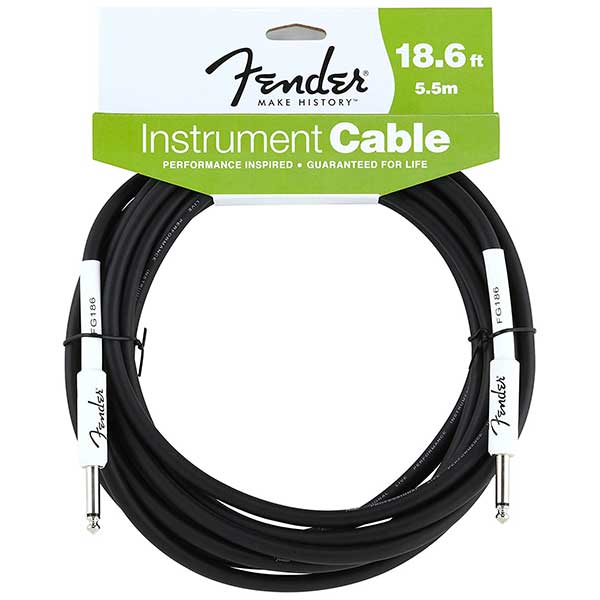
| Estimated Price | $20 |
| Length | 18 feet (5.48 meters) |
| Insulation Material | 8 mm PVC Jacket |
| Connector Type | Straight to Straight, Straight to Right Angle |
My Review: If you’re looking for a budget-friendly, no-fuss, dependable set of cables that serve you well, then the Fender Performance series is worth exploring. The 90% copper shielding offers decent flexibility for the price and does a fairly good job of cutting out interference noise. The flexible construction prevents permanent kinks and twists, while the thick PVC outer jacket does a decent job of preventing crackles and pops. You can choose from straight to straight and straight to right-angled connectors, depending on your setup.
Overall Build and Design: The Fender Performance series is a pretty thick and weighty set of cables. This is good from a durability point of view. At 18 feet long, they can work well in a rehearsal space as well as on stage for a performance. However, it’s only available in black, and the lack of color options could make the cable hard to spot in case you’re on stage in a low light situation, surrounded by several other cables.
Insulation and Flexibility: These cables sport an extra-thick 8 mm outer PVC jacket that acts as a protective layer from wear and tear. At the same time, it also works well to cut out any handling noise and crackles. We’d recommend handling the connector ends with slight care since the thickness of the cable on the ends might make it prone to breakage if handled very roughly. Under most regular circumstances though, there shouldn’t be any issues.
Connector Type: They have a straight to straight connection as well as a straight to right angle variant, so you can take the pick according to the configuration of your instrument’s input jack. The connectors have an additional extra-thick PVC jacket that protects them from damage and rough use and also prevents unwanted pop and crackles.
Shielding and Signal Quality: The core of the cable is made from oxygen-free copper, and with 90% coverage shielding, it takes care of eliminating buzz and interference noises. All in all, it provides a clean, crisp sound that retains the frequencies of the original guitar tone. If you’re looking for the best cheap guitar cable this is one of my top recommendations. You won’t be disappointed with Fender instrument cables.
Notable Features:
- Budget-friendly price
- Flexible yet durable outer shielding
- Sturdy connectors
7. George L’s 155 Guage Cable with Straight Plugs Superbly Crafted Cables
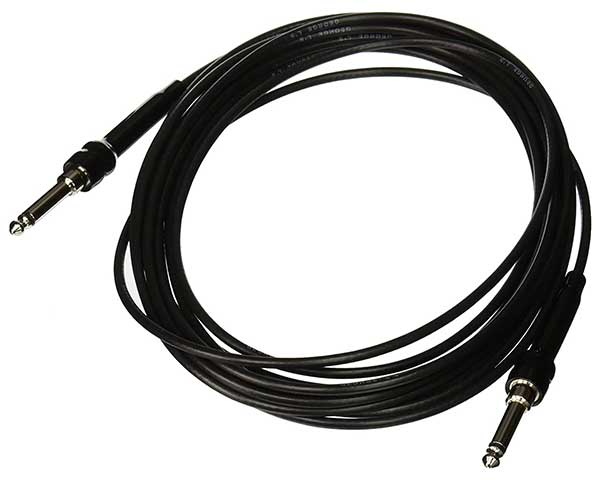
| Estimated Price | $60 |
| Length | 20 feet (6 meters) |
| Insulation Material | PVC |
| Connector Type | 1/4” Straight to Straight |
My Review: George L’s superior quality cables are something that many guitar virtuosos like Eric Johnson have come to depend on, and for good reason. These award-winning thin yet superbly performing cables have been in the business for over 30 years, and have always impressed us with their crisp sound quality, lightweight, ultra-low capacitance, and flexibility. Granted, they are on the pricier side but knowing how long they last, they may turn out to be a better deal than having to change cheaper cables every few weeks.
Overall Build and Design: One of the most interesting things about George L’s is that at a .155 diameter, they don’t come across as extremely heavy-duty in their build. They are almost half the thickness of regular instrument cables made by other brands. This may throw new users off, especially those who are used to using thick, rugged cables. However, don’t be fooled by their slim construction. They are very tough, durable, and can take quite some wear and tear without comprising the sound quality. Aside from classic black, the cables are available in a variety of colors including purple, red, or blue.
Insulation and Flexibility: These cables are impressively lightweight and flexible, which makes them quite easy to coil, without twisting or kinking. They are surrounded by a tough outer insulation PVC cover that protects the inner shielding and prevents them from wear and tear.
Connector Type: This model of George L’s are available in a straight to a straight connector type and have solderless contacts. With the tips firmly clamping down on the wire, the connection stays solid without any hiss or noise. While the red cable option comes with brass plated plugs, the black cable option comes with nickel-plated plugs and the blue variant has gold plating.
Shielding and Signal Quality: The magic of George L’s lies in their high-density braided shielding with ultra-pure copper. As a result, these babies have excellent frequency response and some of the lowest capacitance in instrument cables. As a result, players get superior sound clarity and suffer practically no loss of tones or frequencies. They are crafted to be anti-static, so you hear no static or hiss that could comprise the sound quality.
Notable Features:
- Thin yet impressively tough, flexible and durable construction
- Ultra-low capacitance, crisp sound quality
- High-density braided shielding with ultra-pure copper
- Thick outer PVC insulation
- Available in vibrant colors
- Solderless connection
Popular Related Article: Top Ranked Guitar Tuners
8. Orange Crush Instrument Cable
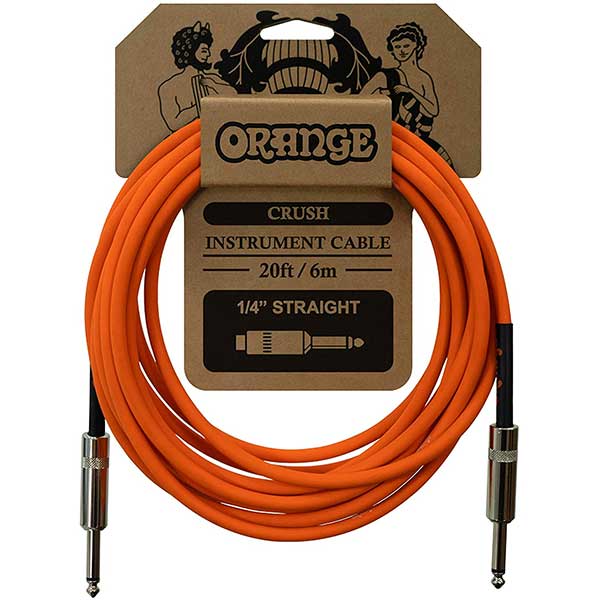
| Estimated Price | $20 |
| Length | 20 feet (6 meters) |
| Insulation Material | PVC and PE insulation |
| Connector Type | 1/4”, Straight to straight, straight to angled |
My Review: Bright, tough, durable, and reliable in their performance, The Orange crush series are high-quality cables that are easy on the pocket and ideal for beginners and experienced musicians alike. Using the purest grade of copper for their inner wiring and multi-layered shielding allows musicians to enjoy high signal clarity and tone without handling noise and interference.
Overall Build and Design: Aside from the brand’s signature orange color that graces the cable, the next thing you notice is that the cables are weighty, with a tough outer layering. This gives them a sturdy, durable feel that feels like it won’t wear out for quite some time. A pretty cool and innovative feature of these cables is that the outer sleeve is heat-shrunk, which makes them more snugly wrapped around the inner cables, protecting them better. This is an especially useful feature to prevent damage when these cables are being used onstage for concerts. For the money, I would say this is easily one of the best guitar cables out there right now.
Insulation and Flexibility: Thanks to multiple insulation layering with both PVC (polyvinyl chloride) as well as PE (polyethylene), the Orange crush series massively cuts down on noise, crackle, and interference. Despite being thick cables, they are not inflexible, they are still easy to coil and wrap up once you’re done using them.
Connector Type: These cables come with hand-soldered, nickel-plated, ¼ “ jacks. Thanks to the nickel plating, the connectors have an additional layer of protection from corrosion. Moreover, the plating also allows for better conductivity.
Shielding and Signal Quality: While the brand doesn’t mention the exact type of shielding that it employs for the cables, they do mention that the Orange crush series uses ultra-pure, oxygen-free copper for their shielding, which results in minimal signal loss and clear tone, articulation and sound quality from your guitar.
Notable Features:
- Heat-shrunk outer covering for protection against damage and stress
- Multiple layers of PE and PVC cover to cut down noise, crackle, and interference
- Highest grade, oxygen-free copper shielding
- Hand-soldered, nickel-plated jacks
- Budget-friendly price
9. Canary Premium Instrument Cables
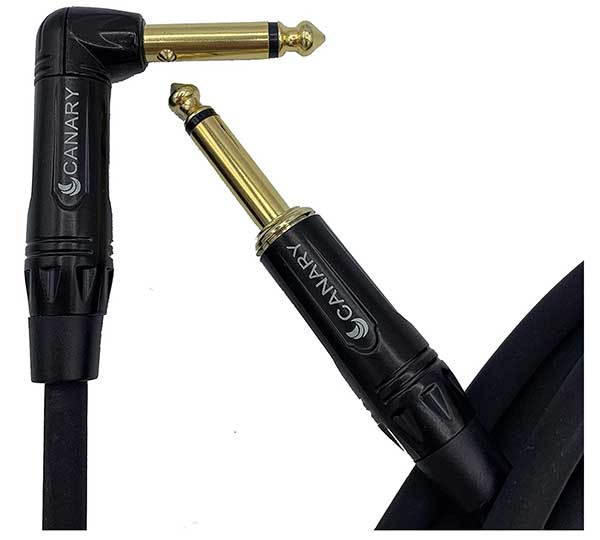
| Estimated Price | $15 |
| Length | 10 feet (3.04 meters) |
| Insulation Material | Polyethylene (PE) |
| Connector Type | 1/4” Straight to Right Angle |
My Review: At $15, we didn’t expect these cables to work as well as the high-end options on the list. But boy, were we surprised! These instrument cables by Canary cables are solid and very impressive with their sound quality, lack of noise, and overall design. With an oxygen-free copper core, gold plated plugs, and PE isolation, players can expect a crisp and clear reproduction of their tone. The best part about them? Check out the auto-mute switch that gets rid of the grounding ‘pop’ noise when you plug or unplug your guitar. A great deal for the price, in our book.
Overall Build and Design: At 10 feet, these cables may be slightly on the shorter side, but will work quite well for a bedroom guitarist who’s looking to record or play in a compact space. We like their weighty, sturdy feel that appears to be durable. Another bonus is the way they easily coil without kinking or twisting. They are available in only a classic black, so no alternative color options.
Insulation and Flexibility: With its outer insulation made with PE, this cable stays flexible and easy to coil. The thick insulation also cut down static and noise. The automute switch on the cable is the cherry on the cake and it helps cut out any grounding noises when unplugging or plugging your guitar.
Connector Type: The connectors have a straight to right angle configuration, which works well for most guitars. The right angle definitely helps in preventing unnecessary strain on the guitar’s input jack. The gold plating on both plugs makes them highly corrosion-resistant and lengthens their life. Another big plus is that the plugs are rounded and tapered, which ensures that they don’t accidentally scratch your beautiful axe when plugging or unplugging.
Shielding and Signal Quality: By using high-quality oxygen-free copper, they manage to bring out impressivly clear sound quality. We tried them out with several amps and guitars and were quite pleased with the sound across different setups.
Notable Features:
- High-quality cables at a very affordable price point
- Sturdy and thick PE outer insulation
- Auto mute switch to kill grounding noise when plugging/unplugging
- Oxygen-free copper core for crisp, clear sound
- Corrosion-resistant, Gold plated plugs
- Rounded, tapered plugs to prevent scratching the guitar body
10. D’Addario Instrument Cables
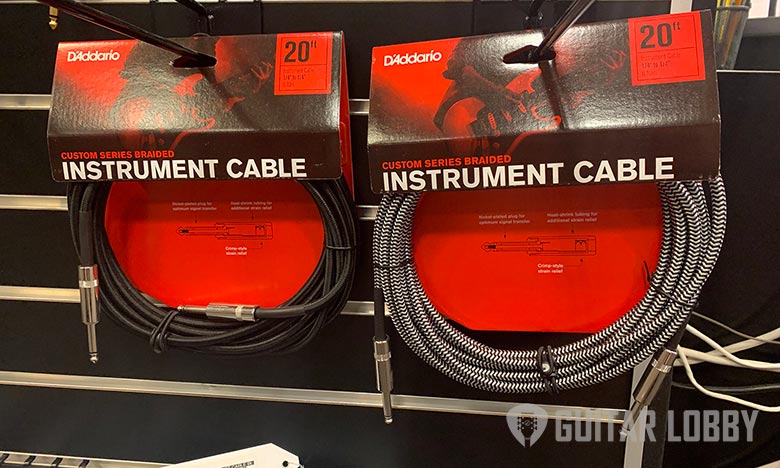
| Estimated Price | $24 |
| Length | 20 feet (6 meters) |
| Insulation Material | PVC |
| Connector Type | 1/4″ Straight to right angle |
My Review: Known the world over for manufacturing some of the most widely used guitar strings, D’addario has managed to impress us with its 20’ circuit breaker instrument cables as well. Its thick, multi-layer insulation, gold plated plugs, solderless assembly, and a pure copper core come together to make a corrosion-resistant, durable, and high-performance instrument cable that transmits clear, noise-free sound. Like the Canary cables, these also have a kill switch for hassle-free and noiseless instrument changes. At this price point, they’re sure to make a lot of guitar enthusiasts happy with this offering.
Overall Build and Design: These are heavy-duty cables with a thick outer layer and sturdy components and connections, which means they’ll last you a decent while and won’t give out at the first sign of rough handling. Being 20 feet long, you can use them not only in a big rehearsal space but also onstage when in the mood to walk around while playing your riffs.
Insulation and Flexibility: They have a thick, rather stiff outer PVC covering, which does a good job of noise rejection and protecting the inner wiring from damage. However, it also makes them not as flexible as the other options available on this list, making them prone to kinking if you’re not careful.
Connector Type: We love the circuit breaker, or the ‘kill switch’ on these. It’s quite a useful feature that lets you unplug and plug instruments absolutely noise-free. The straight to right angle connection with solderless assembly serves the user well. This makes for a solid connection, and also gives you the freedom to make quick fixes with a screwdriver and cutter in case of issues. Moreover, the gold-plating on the plugs makes them pretty-corrosion resistant.
Shielding and Signal Quality: By using ultra-pure, oxygen-free copper as the core, it eliminates any signal loss and leads to quite a low capacitance. This results in a clear, pure tone that retains the character of your guitar tone. The dual-layered shielding is another great feature that offers impressive insulation as well as cuts out interference or crackle.
Notable Features:
- Circuit breaker switch for noiseless instrument changes
- Ultra-pure oxygen-free copper core for low capacitance
- Solderless connection
- Corrosion-resistant gold-plated plugs
- Dual-layered shielding for high insulation and low interference
- Budget-friendly price point
11. Monster Rock Instrument Cables

| Estimated Price | $60 |
| Length | 12 Feet (3.65 meters) |
| Insulation Material | Carbon-infused Polymer |
| Connector Type | Straight to Straight |
My Review: Rock Guitarists looking for a great, clear tone and a tough cable, the Monster Rock series is perfect for that. Measuring 12 feet long, they have a dense, braided 95% copper core that cuts out interference noise, providing a clean tone. A layer of carbon-infused polymer surrounds the core to further cut down vibration noise. Finally, it’s also protected by a tough duraflex cover, they stay flexible while preventing any damage. Add corrosion-resistant, 24 karat gold plated plugs to the mix, and you have a pretty solid cable that’s worth the money.
Overall Build and Design: These are pretty sturdy cables that can last you a long time, thanks to their made-to-last construction. The multiple outer layers protect the delicate inner cable from rough handling that would inevitably happen if you’re on the road. However, at 12 feet, they’re on the shorter end of the spectrum, so they might be better for use in rehearsal rooms and compact stages, rather than larger performance spaces.
Insulation and Flexibility: The outer layer of these cables is made with a special dura-flex jacket. This material is incredibly tough and long-lasting and protects the cables from wear and tear. At the same time, it is flexible enough to let the cables easily coil or ‘lay’ without kinking or twisting.
Connector Type: Both the connectors on the cable are plating with 24 karat gold, which amps up their conductivity, while also making them pretty corrosion-resistant. The plugs on this variant have a straight to straight configuration, which would work well on a Fender Strat, but may put stress on your guitar input’s jack in case of other models.
Shielding and Signal Quality: Monster Rock cables have high density braided shielding that uses 95% copper core. In our experience, braided shielding is the best configuration for signal clarity and noise rejection, and the same can be seen on these cables. In addition to this, they also have an additional outer layer of carbon-infused polymer and additional patented wire networks that further eliminate handling noise and vibration. As a result, guitarists can expect a clear, transparent tone with an extra sonic ‘bite’ as the brand calls it that lets your guitar tone shine through.
Notable Features:
- High-density 95% copper braided shielding for clear, transparent tone
- Carbon-infused polymer shield to eliminate handling noise
- Additional multiple wire networks to retain and enhance tone character
- 24 carat, Gold plated plugs for corrosion resistance
- Duraflex outer jacket for protection against rough handling
12. GLS Audio Professional Series Guitar Cables
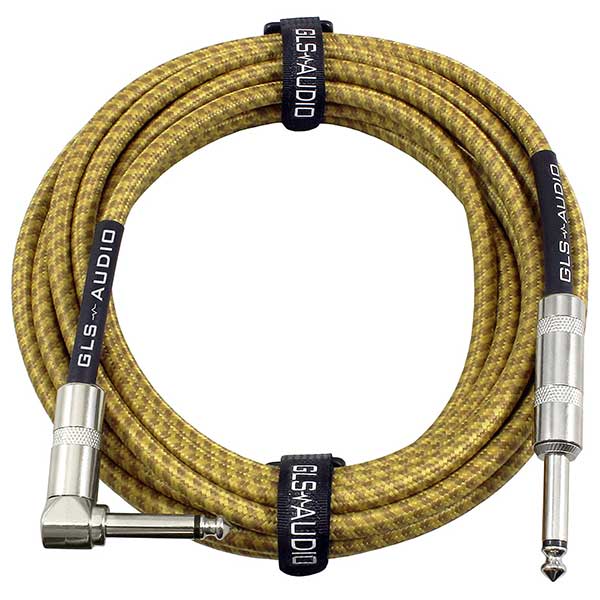
| Estimated Price | $15 |
| Length | 20 feet (6.09 meters) |
| Insulation Material | PVC shielding and Braided Tweed Jacket |
| Connector Type | TS 1/4” Straight to Right Angle |
My Review: One of the most affordable cables on this list, The GLS Professional series is quite popular amongst beginners and guitar hobbyists alike for offering dependable, well-constructed cables with good sound quality. Both the core and the insulator shield of the cable are made with oxygen-free copper that offers low capacitance and preserves sound quality. Moreover, a triple strain relief protection system at three strategic points of the cable ensures that they do not wear out from damage or overuse, and are durable. If you’re looking for good quality cables that don’t burn a hole in your pocket, then the GLS Professionals are definitely worth looking into.
Overall Build and Design: At 20 feet long, these cables are good for use in sprawling rehearsal rooms and stage performances alike. By using high-quality components both for its shielding and outer covering, these cables can last for a considerable duration. The bright tweed outer jacket makes the cable easy to spot on stage and avoid tripping, especially when it’s dark. The velcro loops attached to the cable make them easy to coil without getting tangled up.
Insulation and Flexibility: The cable’s external rubber covering heat shrunk so that it snugly wraps around the cable and protects it from damage. It also has an internal rubber strain relief as well as an internal metal clamp relief. Together, this forms the three-strain relief system that protects the cable from damage at these three strategic points. As an additional layer of protection, the braided outer tweed jacket works pretty well. Despite multiple layers of shielding, the cable stays nice and flexible.
Connector Type: The straight to right angle connection would put less stress on your guitar’s input jack, which is always welcome. The protective rubber sleeves that cover 4-5 inches of the cable across both the plugs further shield them from damage.
Shielding and Signal Quality: These cables have dual copper shielding that works to cut out interference while preserving signal purity. The core of the cable is made with OFC or oxygen-free copper which is the industry standard and does a good job of offering a clear, crisp sound quality. It is further surrounded by a conductive PVC outer layer that does a good job of cutting out interference and handling noise.
Notable Features:
- Dual copper shielding to cut out handling noise
- Triple strain relief system to relieve pressure from strategic points of the cable
- Oxygen-free copper core
- Tough tweed outer jacket
- Very budget-friendly
13. ProCo Evolution Studio Guitar Cables
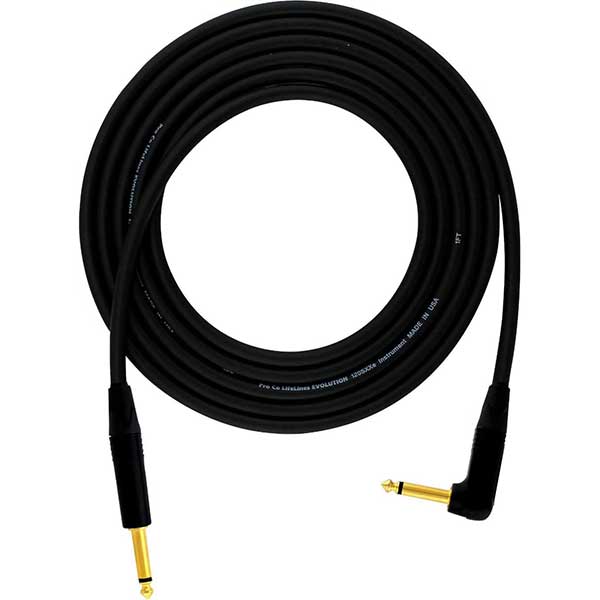
| Estimated Price | $50 |
| Length | 10 feet (3.04 meters) |
| Insulation Material | Soft-Touch PVC |
| Connector Type | Straight to Right Angle |
My Review: Founded in 1974, ProCo has been manufacturing specialty audio interface components, including cables, for over 50 years. The Evolution series is yet another testimony of their commitment to quality. With a 100% Oxygen-Free copper shield and 24 gauge copper conductor core, you get low capacitance, resulting in a pure, clear, and natural sound. Thanks to its soft-touch PVC outer cover, it is super flexible and lays flat on the ground without any twisting or kinking. Whether you’re in the studio tracking on a song or performing live onstage, these cables will hold you in good stead for a long time to come and are worth investing in.
Overall Build and Design: What we particularly love about these cables is how nimble and pliable they are, without compromising on durability. They’re easy to coil and lay completely flat on the ground, without the annoying ‘cable memory’ that most other products have that kinks and twist them in the shape they were last in.
Insulation and Flexibility: The soft-flex insulation covering on these cables is a special feature that’s worthy of being noted. Most cables usually compromise between having a stiff, sturdy outer cover to protect against damage. However, this also makes the cables stiff and prone to kinking. On the other hand, higher flexibility sometimes comes at the cost of using a thinner outer covering that could make the inner wires vulnerable to damage. In the case of ProCo Evolution cables, the soft-flex PVC material makes them extremely flexible while staying impressively sturdy and durable at the same time.
Connector Type: The connectors on these cables are premium Swiss Neutrik plugs that are, again, very high quality. These are precisely crafted, sleek and tough plugs that have a chuck style strain relief that keeps them solidly connected to the cable. Moreover, the brand goes the extra mile and has covered the connects in gold plating to protect them from corrosion.
Shielding and Signal Quality: The cable uses a spiral-wrapped, or serve shield design using 100% pure copper for low capacitance. This is the densest configuration of shielding and works the best to eliminate interference and unwanted noise and crackles. In addition to this, it has 20 AWG OFC center conductors and a 24 AWG OFC conductor that together does a great job of retaining and reproducing the original character and frequencies of your instrument’s sound.
Notable Features:
- Spiral shielding with 100% Oxygen-Free Copper
- Excellent sound clarity and signal quality
- Premium, Gold-Plated Swiss Neutrik Plugs
- Special Soft-Flex PVC cover lays flat on the ground and is durable
14. Donner Guitar Cable
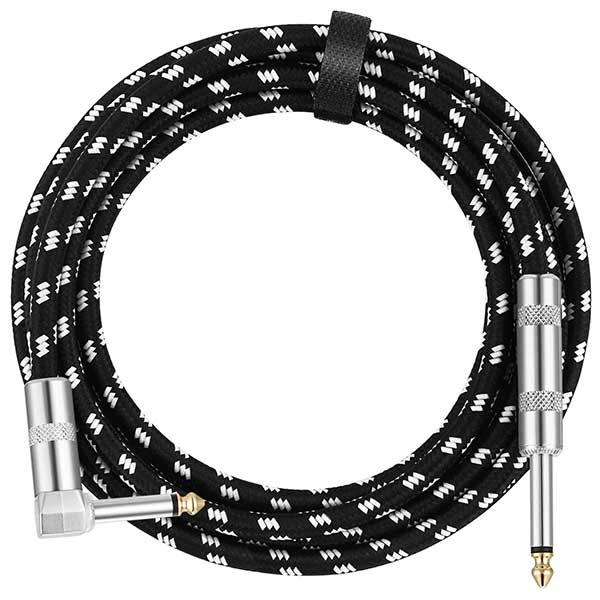
| Estimated Price | $13.5 |
| Length | 18 feet (5.48 meters) |
| Insulation Material | PVC + Tweed Woven Nylon Jacket |
| Connector Type | Straight to Right Angle |
My Review: Founded in 2012, Donner is a relatively young brand that rose to fame with their range of pedals and mini pedals. Priced at a very affordable price point, their cables turned out to be of surprisingly good quality, especially for beginners. Using Oxygen-Free Copper and braided shielding, it cuts out a lot of the ambient noise to offer a silent backdrop. Meanwhile, the PVC outer covering and a woven braided nylon outer jacket together protect the cable from damage and rough use, while keeping them tangle-resistant at the same time. Sure, it may not have the high-end components that fancier cables use, but for its price, the quality of these cables is pretty impressive.
Overall Build and Design: At a length of 18 feet, these cables will serve you well even if you plan to walk around, far away from your amplifier, whether onstage or in the jam room. Overall, it has a fairly tough exterior that is not easy to damage. The bright black and white woven design adds a cool look to your rig, and also makes the cables easy to spot on stage, especially in a low light situation.
Insulation and Flexibility: The outer covering of the cable is made with environmental PVC, and also has an additional outer jacket made with braided woven nylon. Together, these layers do a good job of keeping the cables tough and also cutting out any interference noise.
We wouldn’t say that these cables are the most flexible around, in fact, the woven jacket makes them somewhat stiff. But for the given price point, they perform well, and with a little care, you can prevent them from kinking and twisting.
Connector Type: The cables sport a straight to right angle connection, so you can use the right-angled plug onto your guitar (but may have to use the straight end if you have a Stratocaster or a telecaster). The connectors are well made and crafted with aluminum, which is strong, light, and tough and corrosion-resistant. The gold plated contact is a good touch to improve conductivity and further protect these sensitive components.
Shielding and Signal Quality: The core is made up of pure Oxygen-free copper, and has multiple shielding of a conductive PE and a conductive PVC layer. These all work to cut out hissing and unwanted noise while keeping the signal quality clear.
Notable Features:
- Reliable, Affordable guitar cable
- Oxygen-free copper core and multiple shielding layers
- Braided nylon outer jacket for extra protection
- Sturdy plugs with gold plated connect
15. Hosa GTR-225 Straight to Straight Guitar Cable
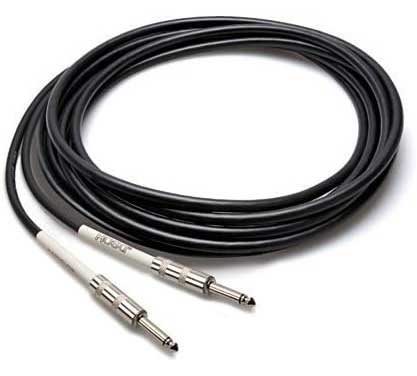
| Estimated Price | $15 |
| Length | 25 feet (7.62 meters) |
| Insulation Material | Rubber |
| Connector Type | Straight to Straight |
My Review: Another excellent choice for those looking for dependable, budget-friendly options, the California-headquartered Hosa brand has been making high quality and affordable cables since 1984. The GTS-225 series uses high-quality components and still manages to keep its prices low. The high density, oxygen-free copper core, and braided copper shielding eliminates electromagnetic interference and preserves signal clarity. Moreover, the all-metal plugs are tough as nails and are durable for extended periods even with a long time of use and abuse.
Overall Build and Design: We like the overall build of these cables, and their sturdiness makes them ideal for practical uses like jamming and rehearsals without needing to bust out the more expensive cables that you may own. The soldering is precise and solid, and the inner plastic stress relief protects the connections from damage. At 25 feet long, they’re long enough for use on all stages of all sizes and shapes.
Insulation and Flexibility: The outer rubber insulation does a decent job keeping the cables protected from damage, but the cables themselves feel a little lighter and thinner compared to the other weighty cables on this list. This is not necessarily a bad thing, just that players used to thicker, weighty cables may find their thin design slightly new to get used to.
Connector Type: The cables sport a straight to straight connection, and the all-metal plugs are solidly built to weather the wear and tear involved when you’re on the road, unplugging and plugging frequently every day.
Shielding and Signal Quality: The Oxygen-free copper core, along with the high-density copper braided shielding together offer enhanced sound clarity and signal quality, and cuts out electromagnetic interference and unwanted noise.
Notable Features:
- Affordable and dependable guitar cables
- Oxygen-free copper core and high-density, braided copper shielding
- Reliable signal clarity
How to Choose the Right Guitar Cable (Buying Guide)
There are certain basic terms and concepts you’ll need to know to get a better understanding of how different cables work and what they are for. Not all cables are built equally and even though their connectors might look similar they may be built for different things.
The cables we generally use for guitar and other applications in audio are called Co-axial cables. These cables have a conductive core or wire, usually made from copper, and some outer shielding for protection from any electromagnetic interference. Let’s take a closer look at their construction and the various separate components that come together to give you that awesome guitar tone and sound out of your instrument:
Types of Cable Connectors
Cables come in many sizes, shapes and with different bits and bobs at their ends. These are called connectors and they perform the same function in different ways.
XLR Connectors
XLR Connectors Short for External Line Return, these connectors can send balanced audio signals across balanced cables. They have 3 pins for hot, cold, and ground inside a circular housing. Pretty much your standard microphone cable. They are also capable of sending stereo information.
TS Connectors
TS stands for ‘Tip, Sleeve’, referring to the 2 parts of the jack connector separated by a small rubber ring. It is a ¼” metal connector (¼” refers to the diameter of the connector) The signal is transmitted via the tip and the sleeve acts as a ground. TS connectors are only capable of sending unbalanced, mono signals. This is your average guitar cable connector.
TRS Connectors
TRS is short for ‘Tip, Ring, Sleeve’. TRS is a balanced jack connector, meaning that the added ring in the middle allows the connector to transmit a second ‘cold’ signal. TRS cables are also capable of sending stereo balanced signals if needed. If you connect a TRS cable to an unbalanced output the signal will still be unbalanced. The cable should work fine, but generally, it’s a good idea not to mix up the two.
RCA Connectors
These connectors are named after the company that invented them, Radio Corporation of America. Generally, they are referred to as phono or cinch connectors. They can be used to transmit audio, video, RF signals, or even DC power. The connectors are generally color coded, Red for right audio, White/Black for left audio and yellow for video. These connectors are unbalanced and as such can only transmit stereo audio or balanced signals when working as a pair.
Speakon Connectors
SpeakON connectors aren’t your average xlr cables. They are specifically meant for transmitting high powered signals, for example from an amplifier to a speaker cabinet. They were originally designed by Neutrik and are rated for 30 amperes. They have special locks and ports designed to easily identify them from other similar looking connectors like XLR.
Types of Cable Shielding
Cables also need to be shielded inside their PVC housing to protect from signal interference. Cables that come with such a shield are referred to as shielded or screened cables. But what it does essentially creates a ‘Faraday Cage’ around the individual wires isolating them from both the ground and any other sources of electromagnetic interference. This shielding can be of different types depending on the application:
Foil Shielding: This type of shielding involves encasing all the internal conductors in a thin foil of either copper or aluminum. This type of shielding offers almost 100% coverage and protects the signal from strong sources of EMI. However, these cables aren’t the most flexible and the foil inside may be prone to breakage if not handled carefully. Foil shielded cables often work best as power cables.
Serve Shielding: This is the most common type of shielding found in instruments and microphone cables. The shield is formed by flatly wrapping small strands of copper around the components in a single direction. This type of shielding affords the most flexibility and is the cheapest to manufacture but can be susceptible to radio interference or other forms of high-frequency EMI.
Braided Shielding: A thin mesh or braid of copper wires surrounds the inner components and creates a faraday cage that gives 70 to 95% protection from interference. While not perfect, it is certainly worth the 5% loss of signal as this type of shielding is highly durable and can withstand the bendiest of situations.
Balanced Vs. Unbalanced Guitar Cables
Unbalanced cables have just the two components mentioned above. A conductive copper core which is usually made from braiding lots of thin copper wires together, and an outer PVC or rubber jacket that protects the core from damage and electromagnetic interference. These cables have 2 wire elements inside, a signal wire and a ground wire. The signal wire carries the unbalanced audio signals from one end to the other and the ground wire essentially completes the circuit.
However, the ground wire also acts as an antenna for any noise that gets picked up as well, whether due to the cable being moved or due to any other electrical components such as lights that might be generating their own electromagnetic fields. Hence these cables work best for shorter distances of less than 20ft. TS and RCA cables are the most common unbalanced cables you might find. More on these connectors later.
Balanced cables, on the other hand, employ some trickery to get rid of pesky noise issues. Balanced cables use a 3rd wire element in addition to the signal wire and the ground wire, only this time the 2nd signal wire transmits the signal with the polarity flipped. The 1st signal wire transmits a ‘hot’ signal and the 2nd wire transmits a ‘cold’ signal.
Any transmission loss (also called attenuation) or noise will get picked up by both these wires. The noise in both the wires will have the same phase but the hot and cold signals are out of phase with each other.
Here’s the cool part, at the end of the circuit, the cold signal will have its phase flipped again so now both the hot and cold signals are ‘in phase’ but the noise in both these signals will be ‘out of phase’ with each other and they’ll cancel each other out, giving you clear, noise-free output when compared to unbalanced cables. XLR and TRS cables are common types of balanced cables. You can learn more about balanced vs unbalanced guitar cables here.
Pro Tip: A general thumb rule to keep in mind when dealing with unbalanced cables, is to not run them parallel alongside power cables or other sources of electromagnetic interference, or EMI. Running them perpendicular and at a distance to such sources of interference can significantly reduce noise issues.
Factors To Consider When Buying A Guitar Cable
Considering all the above information, here are the main things you can keep in mind before making your next guitar cable purchase:
Flexibility: A good guitar cable should be flexible. This is very important because stiff cables are very prone to kinking and twisting, which can ultimately break the outer jacket, exposing the inner sensitive copper wiring. Once this happens, the cable is vulnerable to damage at the slightest sign of rough handling. A flexible cable, on the other hand, lays down flat and easy on the ground and is easy to coil, which prevents any sort of tangling or kinking. Good quality PVC housing on the outside and either braided or serve shielding on the inside make for a good option when it comes to flexibility.
Length: Ideally you should not be buying cables that are longer than what your application requires. It depends whether you’re picking a cable for practice in a compact bedroom, spacious rehearsal space, or for a sprawling concert arena. Most cables upwards of 20ft will end up either diminishing signal quality (which affects the top-end of the guitar signal) or may end up having noise issues. This can become a problem for guitar players using passive pickups.
Connectors: While high-end cables with gold plated connectors do have their advantages, for the most part, connectors from any major brand should be a good choice. Connectors like the Neutrik SilentPlug have some added features that you’ll find on high-end cables like the ones from Mogami. Another thing to consider is the jacket that the connectors come with, metal jackets will ensure that the solder inside the connector will last longer when compared to rubber or plastic jackets.
Price: With most cables, you get what you pay for. The cheapest cables will often do the job but are not reliable performers and will break sooner than later. Cables above the $40 mark are generally a safe bet when it comes to choosing a long term cable. Cables above the $80 form the higher end of the spectrum and will have features and high-grade components suitable for professional use in the studio or for those with more discerning ears.
Frequently Asked Questions About Guitar Cables
Let’s tackle some of the most common questions that people may have about guitar cables and their importance in your sound:
Do Guitar Cables Make A Difference To The Sound?
Well, yes and no. A guitar cable will not completely transform your sound. Great sound is a combination of many factors, of which a guitar cable is merely one of the factors, albeit a significant one. Good guitar cables will, however, retain the color and character of guitar sound and tone, and keep it intact, without distorting it in any manner. High-end cables do tend to be more transparent, however, which can add a lot of clarity in the highs of the guitar.
If you’re struggling to make your guitar sound brighter and other solutions haven’t worked then it is a good idea to invest in a higher quality cable. Better cables are also sturdier and less prone to interference and noise issues which can lead to a better sound.
Do Expensive Guitar Cables Sound Better?
It’s not necessarily a matter of price as much as it is a matter of the components used to craft the cable. There are certain materials such as oxygen-free copper (OFC), multiple layers of shielding, auto-mute switches for easy instrument changing, and gold plated plugs that may cost more and ultimately drive up the price of the cable. However, these qualities go a long way in enhancing sound quality, durability, and signal clarity for the user.
At the same time, this does not automatically mean that all low-priced cables are not good quality products. There are several products that strike a great balance between affordability and the use of quality components, and you’ll find the best picks on our list as you read on.
Bottom line: So there you go, our fellow chord wizards! Whether you’ve just begun your guitar journey or are a discerning audiophile, we hope this curated list helps you find exactly the kind of guitar cable that best fits your needs. Always make sure that the product you go for is made with high-quality components, and is durable, flexible, and works well with your kind of sound and instrument.
If you ask us for our top picks, then we’d recommend the Mogami Platinum and Gold series for those that want the highest-end cables (and have the moolah to spare). However, a great mix of value and high quality would be the Ernie Ball, ProCo Evolution, and D’Addario American Stage cables. Finally, if you’re looking for budget-friendly options, then the Fender Deluxe and Canary Cables will work great for you. So, plug in, tune-up, and play to your heart’s content. Enjoy!

My name is Chris and I’ve had a passion for music and guitars for as long as I can remember. I started this website with some of my friends who are musicians, music teachers, gear heads, and music enthusiasts so we could provide high-quality guitar and music-related content.
I’ve been playing guitar since I was 13 years old and am an avid collector. Amps, pedals, guitars, bass, drums, microphones, studio, and recording gear, I love it all.
I was born and raised in Western Pennsylvania. My background is in Electrical Engineering, earning a Bachelor’s degree from Youngstown State University. With my engineering experience, I’ve developed as a designer of guitar amplifiers and effects. A true passion of mine, I’ve designed, built, and repaired a wide range of guitar amps and electronics. Here at the Guitar Lobby, our aim is to share our passion for Music and gear with the rest of the music community.
